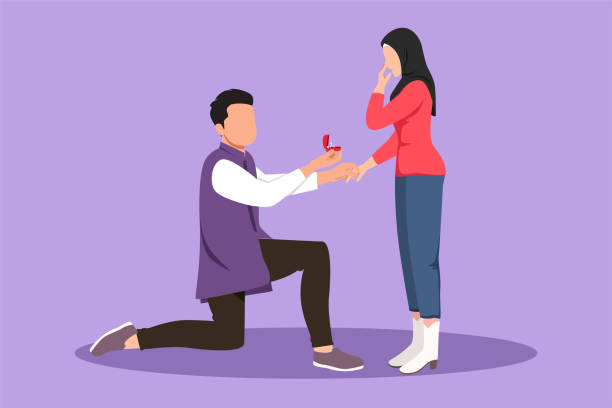In conservative Northern Nigeria, where cultural and religious norms are the gospel, Usman Auwal went against the tide when he married a lady he met through a Facebook match-making page.
Before then, Auwal, an interior designer in Keffi Local Government Area of Nasarawa State, had struggled to find love; his previous relationships, as much as he tried, never led to marriage.
“I know I’m not as rich as some people will expect me to be, but honestly, I’m grateful to God that with my skills, I can make money to cater for a small family, but you see, I couldn’t get the wife, most often, the problem arises from parents. Sometimes, they will push you away because you’re not from their family or tribe,” he told Prime Progress.
Auwal continued his search for love until April 2022, when a friend introduced him to the Facebook page Halal Match-making for Muslims.
In it, details of Muslim men and women searching for life partners are shared, and if any of the members are interested in anyone, they reach out to the admins, who will then begin matching them.
The match
A few weeks after joining the group, Auwal overcame his hesitancy, shared his details, and informed them of his need for a wife.
Two days later, he received a direct message from one of the platform’s admins that he had a match with a lady named Sadiyah from Bida in Niger State. Contacts and pictures were exchanged between them, and they continued chatting on Facebook Messenger to know each other better.
Two months later, Auwal visited her, proposing his intention to marry her to her parents. Sadiyah told her father, Ja’afar Muhammad, that she liked him, and he gave his blessings.
In October 2022, a few men gathered and witnessed the wedding prayers of Auwal and Sadiyah, as conducted by Muslims, and she was then escorted to his home in Keffi.
“The platform [the Facebook group] has given me a sense of hope, and I’m still glad about it to date,” said Auwal. His wife also added that there’s nothing bad about getting married in such a way. “It’s about how strong the hearts are connected. I think this is our destiny,” she stressed.
Auwal and Sadiya’s marriage in a region that is still struggling to utilise opportunities that come with the digital age shows that technology is reshaping cultural practices and providing an innovative solution for those seeking life partners in such a conservative society.
What impact does the platform have?
Created by Zainab Abdullahi in 2020, Abdullahi said the group is transforming how men and women connect, find love, and marry.
Abdullahi argues that since many young people spend their time online, she felt they could as well meet, fall in love and get married.
Due to the founder’s religious background and her goal of not letting the platform deviate from its original goal, there are strict rules that guide its operation. Members are expected to shun sharing sexual content, doxing, catfishing, and are expected to only be in search of love.
The admins, who are volunteers, take their time to vet every request for a match. “Ideally, we ask for their pictures and share it to the match, and we later graduate from that and start collecting their contacts so they will build the connection to a stronger one,” according to Jamila Ibrahim, an admin in the group.
The admins also share the details sometimes in the Hausa language to enable their members who don’t understand English to partake. “You see, it’s northern Nigeria, Hausa is the most spoken language, so it’s good to adopt it since almost all our members understand it,” said the founder, Abdullahi.
According to Abdullahi, since its inception in 2020, the group has led to the consummation of 32 marriages across various communities in northern Nigeria while gathering up to 4,500 members.
Permissible in Islam
While there were initial concerns about whether match-making is allowed in Islam, Usman Baba, a religious cleric in Niger State, said online match-making is a new phenomenon and that there is no record of Islam prohibiting such practices.
The cleric who was present at the wedding prayers of Auwal and Sadiyah in Bida, Niger State, added that as long as both couples fulfil all the mandatory obligations required in marriage by the religion, they are good.
“Although some people may find such acts uncomfortable due to cultural practices, it’s lawful to marry a spouse you got connected to through the digital and social media space,” Baba said.
Also, the parents of some couples say they have nothing against their marriage since they love each other. But at first, Sadiyah’s mother, Amina Ja’afar, didn’t like it until a religious cleric and elders explained that there was nothing bad about it.
Challenges
Despite the successes with match-making, the process is more challenging than it seems.
There have been instances where people who have been matched lose interest and abandon the process.
“Some will show no interest, making pushing the relationship to marriage challenging.” Ibrahim, one of the admins said.
Other times, there have been couples who had to deal with ridicule from their immediate family members who don’t find interest in the process.
“I received many insults and bitter words from some of my family members and even friends for allowing myself to be married to a stranger I met online,” said Mrs Hadiza Misbahu.
Despite the challenges, Abdullahi says she is glad there has been no record of divorce among the married couple.
In Northern Nigeria, Usman Auwal defied cultural norms by marrying a woman he met through a Facebook match-making page for Muslims. Previously unsuccessful in finding a wife due to familial and tribal issues, Auwal found hope in the Halal Match-making for Muslims page, where he connected with Sadiyah. After exchanging contacts and getting parental blessings, they wed in October 2022. This event highlights how technology is offering innovative solutions for traditional practices in conservative areas.
The Facebook group, created by Zainab Abdullahi in 2020, facilitates connections by sharing details and pictures, primarily in Hausa to accommodate language barriers. The group enforces strict rules to ensure members only seek love, avoiding inappropriate behavior. Despite initial concerns, religious clerics approve of such unions if they fulfill Islamic marital obligations. With 32 marriages since its inception and 4,500 members, the group shows notable success despite some challenges like waning interest and familial ridicule. Importantly, none of these marriages have ended in divorce.






